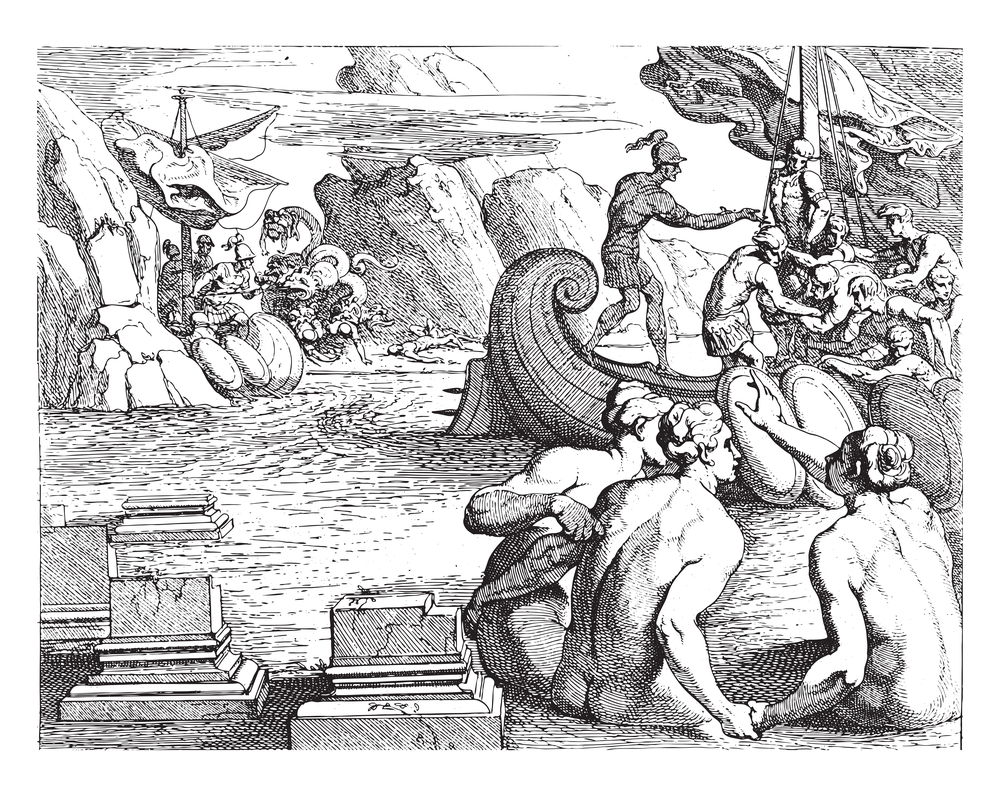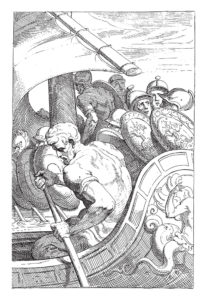Teaching The Odyssey in Economics
By Zachary Gochenour


The story of how I became an economist is its own odyssey: I started college as an English major, intending to hone my creative writing skills, and hopefully to drop out after I wrote the first book of an extremely long, best-selling fantasy epic. The winds of fate blew in other directions and I found myself fascinated by economics: here was a way to describe the world plainly and powerfully. Even when I found flaws large and small with the analysis of economists past and present, economics just made sense to me. It gave me a powerful analytical framework and vocabulary to describe the social world. I was lucky to have great teachers, including one who would eventually become my doctoral advisor, who described economics as “the scientific study of all aspects of the social world,” which hooked me from the beginning. Like most of my students, I had initially thought of economics as being in some sense closely connected to money, a study that never appealed to me. I was wrong. Although I changed my field of study drastically, I was never interested in anything other than what it means to be human and live among humankind. The big questions which motivated the greatest poets and storytellers are still what give life to my work.
Unfortunately, many people are introduced to economics as a branch of applied mathematics having mostly to do with solving optimization problems of one kind or another. This never had any appeal to me, and appeals to virtually no students. When I teach economics, I try to impress from the first day that economics—like anything worth studying—is about understanding what it means to be human. Ideally, it might even help us make a better life for ourselves and others. Literature has the same function.
Homer’s Odyssey1 is one of my favorite stories filled with many truths about these fundamental questions. For all the truth it conveys, though, poesy lacks the analytical precision that the economic way of thinking affords. That said, students are often ready to believe that great stories have a lot to say about the human condition while they are skeptical that economics can do the same. Talking about the Odyssey with my students lets me explore economic concepts with them and demonstrate how examples of how these concepts are at work in various themes of the epic.
Strategy and Game Theory
- “Nobody—that’s my name. So my mother and father call me—and all my friends.” Odyssey Book ix.
Odysseus is a master strategist, a cunning tactician. In game theory, a strategy is a plan to choose among various options where the actions taken by both you and other agents matter for the outcome.
The Odyssey contains myriad examples of Odysseus employing strategic thinking to achieve his goals. A perfect example of strategic thinking is in the cyclops’s cave. Odysseus knows that even if he could kill the cyclops, he could not move the boulder in front of the cave. Even if he were a great fighter who could defeat the cyclops, that path would lead to death for the entire trapped crew. So, instead of slaying the cyclops, Odysseus blinds him, and he and his men sneak out in the morning, when the boulder is moved so the cyclops’s sheep can exit the cave to graze.
A key strategic principle which we see at use here is backward induction, a solution concept in game theory where actions are analyzed from the end to the beginning. In another such example, since no man can resist the sirens’ song, Odysseus knows he will fall victim if he engages them head on. So, he has his men tie him to the mast before the ship comes close enough to hear their song. With these precautionary protections in place, he is able to hear their song and live to tell the tale.
Another game-theoretic concept at work in the Odyssey is the importance and viability of cooperative strategies between strangers. Hospitality customs are at work in several scenes of The Odyssey, for instance when Telemachus and Pisistratus are welcomed in the house of Menelaus. Why should strangers—who might very well be enemies, or at least opportunistic free loaders—be treated with lavish hospitality by others? Is a stranger a potential threat, or a potential ally? For more on this, see Catherine Tracy “The Host’s Dilemma: Game Theory and Homeric Hospitality” (2014)2. Those who value hospitality traditions are rewarded by the gods, reinforcing cultural norms that allow for greater levels of coordination between strangers of good will.
Comparative Advantage
- “Each man delights in the work that suits him best.” Odyssey, Book xiv.
- “The gods don’t hand out all their gifts at once,
not build and brains and flowing speech to all.
One man may fail to impress us with his looks
but a god can crown his words with beauty, charm,
and men look on with delight when he speaks out.” Odyssey, Book, viii.
One of the main themes of The Odyssey is the value of cunning over brute strength. Odysseus recognizes throughout the tale that, unlike the great Achilles in The Iliad, he lacks the requisite strength and martial prowess to reach his goals by fighting. This recognition leads him to employ his mind whenever possible. He is “a man of twists and turns.” His cunning is really what makes him a compelling character from a storytelling perspective, and within the story this gift is what makes him of such interest to the gods, especially Athena.
It is not that Odysseus is not a great fighter or lacks strength. He is, after all, the only man strong enough to string his famous bow. He has spent years fighting and leading men in battle and against the elements. His heroism, however, rarely comes from any application of his strength.
In economics, an economic agent is said to have a comparative advantage when he can produce some output at a lower opportunity cost than another. Comparative advantage is an important principle for establishing the importance of trade. We gain by trading and cooperating with one another because when we focus on our comparative advantages, we are able to have more total output even if no one improves through specialization. Odysseus is good at many things, but has a comparative advantage when it comes to cunning. For most of my students, comparative advantage is seen as a counter-intuitive concept. Developing an understanding of it requires the persistent application of as many examples as I can think of.
Trade-0ffs and Subjective Value
- “There is a time for many words, and there is also a time for sleep.” Odyssey, Book xi.
- “So then, royal son of Laertes, Odysseus, man of exploits,
still eager to leave at once and hurry back
to your own home, your beloved native land?
Good luck to you, even so. Farewell!
But if you only knew, down deep, what pains
are fated to fill your cup before you reach that shore,
you’d stay right here, preside in our house with me
and be immortal. Much as you long to see your wife,
the one you pine for all your days…” Odyssey, Book v.
The pervasiveness of tradeoffs is one of the fundamental realities of human life. The concept of scarcity describes the condition where choices have to be made. Unfortunately, economics textbooks often describe all this as an optimization problem. The sharp-minded student of economics recognizes that each person’s tradeoffs are different because each perceives costs and benefits in a unique way.
For Odysseus and his crew, home and family serve as a primary motivation for all the action of the book. At several junctures, the heroes have the opportunity to give up on the quest and make a new home. Odysseus even has an opportunity to live an immortal life with the beautiful and powerful immortal nymph Calypso. He chooses his wife, Penelope, and his home, Ithaca, over an immortal life of divine luxury, and the audience is meant to think of this choice as noble.
It can be hard for students to understand the decision to choose domesticity over divinity, but in life, motivations are complex. Every person responds to his or her own incentives, and we each respond in different ways. When teaching economics, it is easy for students to believe that economists see human beings as automatons that respond in entirely predictable ways, just as they might in a homework problem. I use The Odyssey to show that beauty is in the eye of the beholder. What is valuable to a person is entirely individual.
Agency Dilemma
- “‘This dog,’ answered Eumaeus, ‘belonged to him who has died in a far country. If he were what he was when Odysseus left for Troy, he would soon show you what he could do. There was not a wild beast in the forest that could get away from him when he was once on its tracks. But now he has fallen on evil times, for his master is dead and gone, and the women take no care of him. Servants never do their work when their master’s hand is no longer over them, for Zeus takes half the goodness out of a man when he makes a slave of him.” Odyssey, Book xvii.
One of my favorite parts of the Odyssey is our hero’s homecoming and his battle with the suitors. Upon his return, though, he finds a number of suitors have arrived to win the hand of his wife Penelope. Scholars disagree on exactly why they want this, though clearly Penelope is a beautiful bride and marrying her is a key to the kingship of Ithaca. When Odysseus returns home, his dog recognizes him, but without his master there to care for him, he has fallen into a state of disrepair, and soon after, expires.
In economics, an agency dilemma or principal-agent problem occurs whenever an economic agent is acting on behalf of someone else (the principal), presumably in the interest of the principal. But the agent has interests of his own, creating a moral hazard where the interests are not aligned. The above quotation about the neglected dog Argos is a perfect example of the principal-agent dilemma, and solutions to this problem are something that humans have been trying to figure out for thousands of years.
Great stories help us better understand ourselves. Economics does the same.
Economics also comes with its own technical vocabulary for describing the world and the actions of the people in it. As a teacher of economics, I have often found that students assume that economics only has applicability in the modern world of markets and impersonal, optimizing agents. The examples in this essay should not only be helpful to economists looking to emphasize the timeless and universal relevance of the economic way of thinking, but also to teachers of literature who want to show how the story includes all sorts of practical lessons for understanding people today.
Footnotes
[1] Available online at the Online Library of Liberty: The Iliad and the Odyssey.
Available for purchase, the Robert Fagles translations: The Odyssey, by Homer, translated by Robert Fagles at Amazon.com.*
[2] Illinois Classical Studies, No. 39 (2014), pp. 1-16
*Zachary Gochenour is a Lecturer in Economics at James Madison University. He uses economics to write about politics, law, and history. He received his Ph.D. from George Mason University in 2014.
